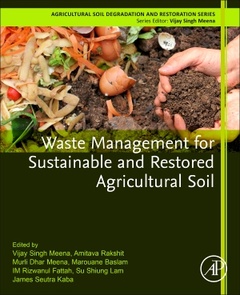Waste Management for Sustainable and Restored Agricultural Soil
Coordonnateurs : Meena Vijay Singh, Rakshit Amitava, Meena Murli Dhar, Baslam Marouane, Fattah IM Rizwanul, Lam Su Shiung, Kaba James Seutra

Waste Management for Sustainable and Restored Agricultural Soil provides a holistic approach to various mechanisms of waste management for plant nutrients, highlighting the importance of improving plant growth, nutrient concentration, and system sustainability for enhancing crop production and achieving desired environmental goals. Covering a broad overview of different kinds of wastes and waste recycling methods and sustainable management for soil health, this book focuses on both basic and applied aspects of waste management for sustainable agriculture and how nutrients are made available through waste.
Academics, professionals, researchers and policymakers working in the fields of safe waste management for potential use in agricultural crop production will benefit from this book.
2. Waste management for Healthy agricultural production system
3. Importance of organic wastes recycling in agricultural production system
4. Waste management: an opportunity or threats for global food production
5. Municipal solid wastes impact on human health and the environment
6. Short-term effects of waste applications on heavy metals distribution in a normal/degraded soil under different agroecology
7. Use of nutrient-enriched compost in soil-crop management
8. Role of effective microbes in composting and crop productivity
9. Response of soil microbial communities to Waste Materials and amendments
10. The importance of land-use legacies to ecology and conservation
11. Crop residues: status, distribution, management, and agricultural sustainability
12. Biochar aspects in the sustainability of agriculture and environment
13. Index for characterizing post-waste applied soil environments
14. Enriched organic manure as a strategy for agronomic biofortification of crops
15. Long-term effect of waste application on soil management and sustainable crop production
16. Sustainable waste management: Policies and Case studies
17. Waste management guidelines across different continents
18. Waste application in agricultural soils: State-of-the-art
Dr. Vijay Singh Meena has made remarkable contributions in the field of agricultural research, aligning his efforts with the United Nations Sustainable Development Goals (SDGs). Particularly, his work focuses on evaluating and promoting climate-resilient technologies for diverse cropping systems, directly contributing to SDG 2 (Zero Hunger) and SDG 13 (Climate Action).
His expertise lies in optimizing input usage, fostering carbon-neutral farming practices, and enhancing productivity and profitability in agriculture, which are integral to achieving SDG 2 by ensuring food security and promoting sustainable agriculture. Furthermore, his initiatives in evaluating climate-resilient technologies align with SDG 13 by addressing climate change impacts and promoting adaptation measures in agriculture.
Dr. Meena's academic background in Soil Science and Cropping System Management, coupled with his extensive research experience, has equipped him with a profound understanding of cropping systems. His expertise in input optimization, quantitative cropping systems analysis, and soil health management has significantly contributed to improving livelihoods in South Asia, thus supporting SDG 1 (No Poverty) and SDG 2.
Furthermore, Dr. Meena has been recognized for his scientific excellence, receiving prestigious awards such as the INSA Young Scientist Award and the IASWC Budding Scientist Award, which further highlights his contributions towards achieving the SDGs. In summary, Dr. Vijay Singh Meena's outstanding achievements, leadership abilities, and commitment to agricultural innovation directly contribute to advancing the SDGs, particularly SDG 2 (Zero Hunger) and SDG 13 (Climate Action), and make him a valuable asset in promoting climate-resilient agriculture and sustainable food systems.
Amitava Rakshit is a faculty member of the Department of Soil Science and Agricultural Chemistry at the Institute of Agricultural Sciences, Banaras Hindu Un
- Focuses on understanding basic and applied aspects of waste management for sustainable agriculture and how nutrients may be made available through waste
- Presents a broad overview of the wastes generated and their sustainable management for restoration of soil health
- Highlights waste characteristics and nutrient releasing patterns during decomposition of waste
Date de parution : 05-2024
Ouvrage de 460 p.
19x23.3 cm



